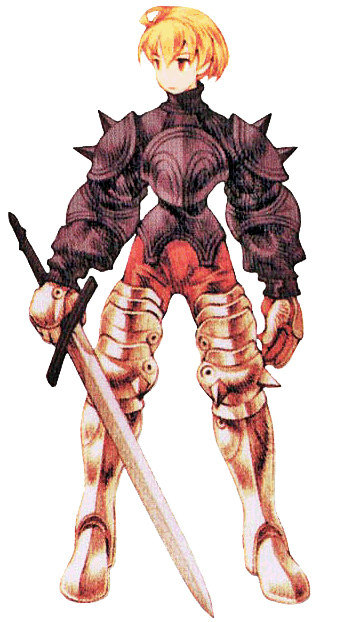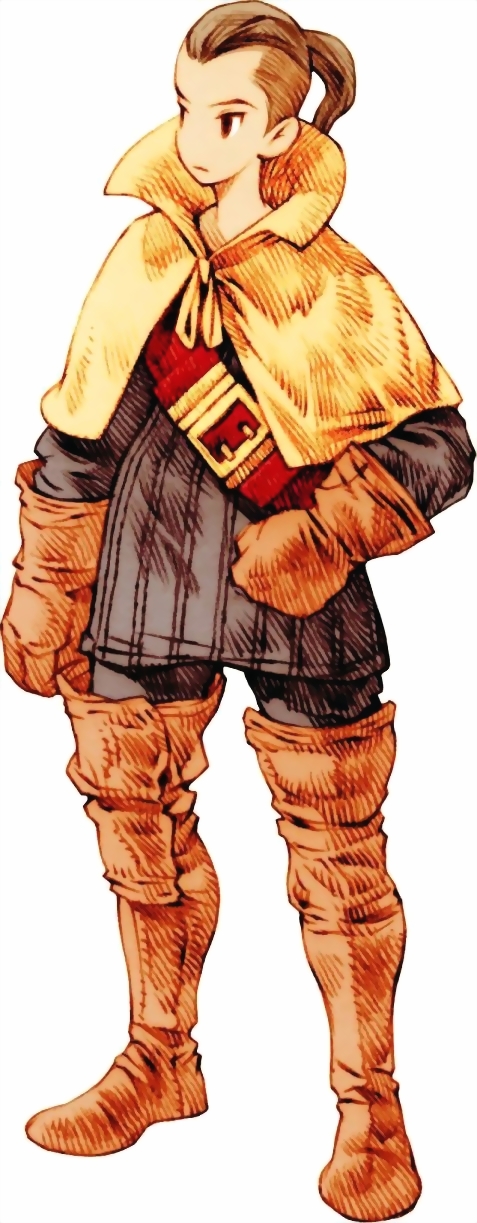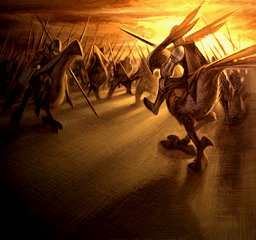Final Fantasy Tactics is not just one of the greatest games ever made, it's the game that changed the way I look at gaming. The story was amazing, the game play was top notch, the graphics blew me away. Yes it had its flaws, but it still blew me away, and was a deciding factor in me choosing the road I'd take in life. Of course, it didn't turn out the way I wanted to, but hey. But I'm not here to gush about FFT, I'm here to share some of the lessons that one learns from playing the game.
Lesson 1: History is based on a true story
What we know about History is often not the whole story, if any of what we know is correct at all. When in school, we are taught certain things that are, well, wrong. For example, citizens of the USA are taught that the US was the sole nation that won World War 2. Russians, on the other hand, are taught that it was the Soviet Union that defeated Nazi Germany, and no one else. Puerto Ricans are often taught that they invited the United States of America back in 1898. We are often taught that people in the Middle Ages thought the world was flat, and that Columbus was the sole voice of reason, arguing that the world was round. That's wrong, all of it. Final Fantasy Tactics presents this lesson right from the get go, with the topic of the Lion War. The official history is that Delita Hyral, the man that married Princess Ovelia of Ivalice, rose to power, ended the war, and became a hero of the people.

Ivalice's Hero, according to the books.
However, the game takes us back to the time of the Lion War to show us the true hero of the Lion War, a man whose name had been sullied for the past five centuries for the crime of blasphemy against God. His name was Ramza Beoulve, and it was he who helped end the Lion War. For the crime of murdering two cardinals, Ramza has been branded a heretic, and it is for this reason that there exists but one record of Ramza's role in the Lion War, and this record was heavily censored, even kept hidden from the public.

The hero Ivalice needed, but never deserved.
The truth was concealed, not by Delita, but by the Church of Glabados. Which brings us to the next lesson...
Lesson 2: Truth has enemies
Truth should never be seen as an inconvenience, but it sadly is, especially for people and organizations whose goals depend on the propagation of lies. We see it in real life, all the time. Gun advocates in the United States who would rather the people not know the amount of mass shootings that have occurred in the US in 2013 (about 250), creationists who'd sooner burn a hundred biology books than to let their beliefs be questioned, and so many example, that I can not name them all. The truth has enemies, and these people would go to ANY lengths to hide it, distort it, and destroy it. The game presents this simple lesson in the prologue and epilogue. The Church of Glabados had hidden the sole record of Ramza's deeds, the Durai Report, in order to keep the public from knowing their own role in the Lion War. The truth is, the Church was manipulating both sides of the war in order to stage an 'intervention', remove the office of King of Ivalice, and turn the country into a theocracy, with the Elder of the Church as the undisputed leader of the realm. To achieve this, the Church had planned on using the power of the Zodiac Stones, twelve special stones with immense power, that could be used to sunder entire armies. Ramza, however, put a stop to all that, collecting the stones and destroying the demons that were housed in them. The first cardinal that Ramza killed, Delacroix (Draclau in the original PS1 version of the game) had used the stone to become the demon Chuchulain (Queklain in the original PS1 version). But the church saw Ramza as an obstacle, a spanner in their machinery that, if not dealt with, would ruin their machinations. It is for this reason that the Church persecuted Ramza, refused to give him a burial when he was declared dead, and burned the writer of the Durai Report, Olan Durai, at the stake.




Oulan Durai, burnt at the stake for daring to say something the Church did not want to hear.
Lesson 3: War is often declared by those with ulterior motives
I've mentioned the term "Lion War" a few times. The Lion War, or War of the Lions, was a civil war that was fought in the kingdom of Ivalice between two factions. The first was the Order of the Northern Sky (Hokuten, as I'll refer to them as), and the second was the Order of the Southern Sky (Nanten). The Hokuten were lead by Prince Bestrada Larg, while the Nanten were led by Duke Druksmald Goltana. The reason? The king of Ivalice had died, and the heir was only one year old, and was probably a child concieved by a lover of the Queen anyway. Larg argued that the prince, Orinas, was the true heir to the throne, while Goltana argued that Princess Ovelia, the King's younger sister, should be heir. Their true intentions, however, were far more nefarious. If Orinas became King, then that would mean that Larg would become his Regent, making him the de facto King of Ivalice. If Ovelia, who was only fifteen at the time, became Queen, then Goltana would become her Regent by virtue of being her cousin as well.
Lesson 4: War is hell
The Lion War is a costly disaster. Goltana is forced to increase taxes on his land by 35% just to keep funding it, all the while with thousands of soldiers dying on both sides. The citizens suffer, the soldiers suffer, and only those at the very top, the ones pulling the strings, are the ones who do not have to feel the fury of this war. People go hungry in the game, and there are many who voice their discontent. Bandits become more commonplace, riots erupt everywhere. Many are the soldiers that desert their armies, just to get back to their starving families. Many of these deserters are hunted down and killed. It's a mess.

Can't even tell which side is which...
Lesson 5: Using people is wrong
How did Delita become King, anyway? He married Ovelia. In order to get close to Ovelia, he played everyone around him like a fiddle. He assassinated Goltana, the man he had sworn fealty to. He pinned the blame on Orlandu, Goltana's most trusted general (though Orlandu was OK with it because he was also reported dead soon after). He killed people left and right, pitted them against each other, falsifying evidence of deceit. He had earlier kidnapped Ovelia so he could bring her to Goltana, who would then use her as leverage for the throne. He made empty promises to Ovelia, promises of peace and justice. Delita murdered Goltana, had hundreds of soldiers killed, murdered several of Goltana's supporters, had the Queen and her infant son arrested and detained in a dungeon. And in the end, in a fit of madness, Ovelia tried to kill Delita, who in turn murdered his wife in self defense. The game subtly hints that Delita truly loved Ovelia. Shame, considering who he once was...
Lesson 6: Even history's greatest monsters were just people
Delita used to be a nice kid. He was loyal, he was friendly, he was idealistic, he was Ramza's best friend. One day, his sister, Tietra, had been kidnapped by anti-nobility revolutionaries, because they confused her for a member of House Beoulve, a noble family. During a skirmish, Tietra got caught in a crossfire. Actually, no. Tietra had been used as a hostage by one of the revolutionaries, but Ramza's older brother, Zalbag, had ordered a subordinate to simply shoot at Tietra, thus turning a hostage situation into a massacre. Delita saw this. He saw Tietra die right in front of him. That was the day the sweet kid died, and the cynical Delita was born. From that day on, Delita would have no qualms about killing, using people. I am reminded of this piece of art that had caused quite a stir in Germany, a statue of a child praying. The child was representing Adolph Hitler in his youth.
Yeah, this one
We very often forget that the people that helped shape our history, good or bad, were simply that: people. People with flaws, people with virtues, people who made mistakes. It is irresponsible to elevate these people onto a pedestal, for example the way the US treats the Founding Fathers, just as it is to lower a person, to demonize that person to the point that he or she becomes an inhuman monster. Even someone like Adolph Hitler was a child once.
Lesson 7: History's greatest heroes are unsung
Ramza was the one who fought against the church. He stood up for what was right. He stood up against a corrupt system that treated people like pawns. He confronted a Church that was lying to its people. He fought for a world where people would not suffer under the hands of the cruel and the corrupt. He was always there, in the front lines, fighting for justice. His reward? Not even a burial. He made the worst enemies possible, ones who could screw him over even in death. Abandoned by his family, save his younger sister, Ramza faced a cruel and unjust world, and received no reward, no recognition. He was even denied a burial! His name spent four hundred years sullied by the mark of heresy! But he did what was needed. His work had saved Ivalice, and only a handful of people would ever know. And one of those few died trying to spread the truth of what had happened. Ramza is Ivalice's greatest hero, and no one would know of his deeds for another four hundred years. Most of history's greatest heroes are like that. We know who led the Continental Army in the American Revolution, but can anyone name ten soldiers that fought for their country's independence? Can anyone name so much as five of the millions of soldiers that died in World War 1? When was the last time a school did ANYTHING to commemorate the Righteous Among the Nations, aside from viewing Schindler's List? Something to think about...
No comments:
Post a Comment